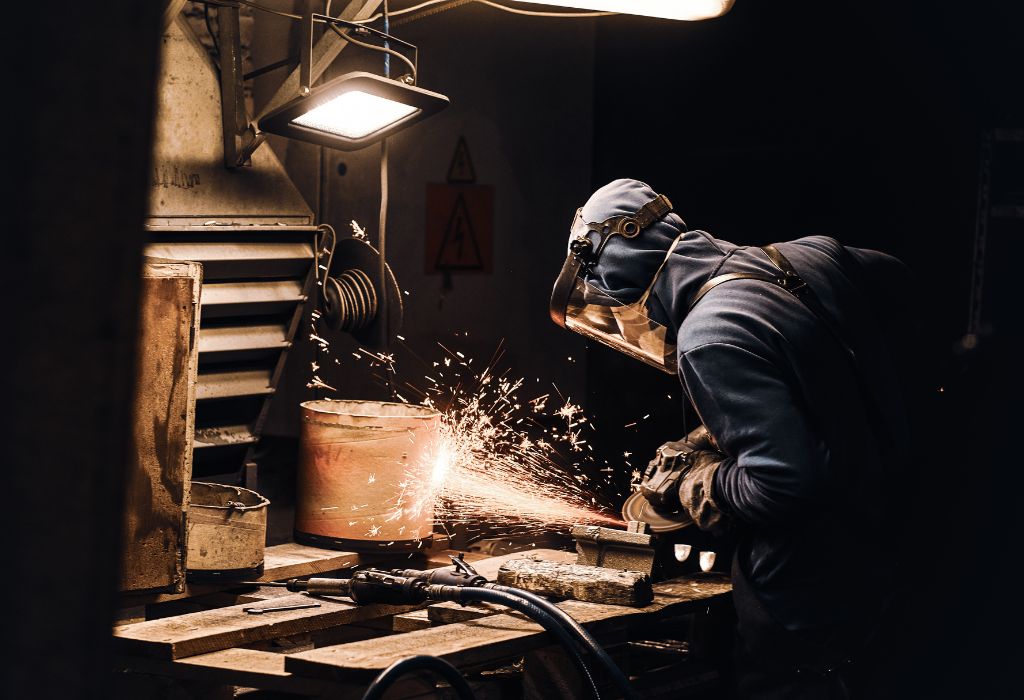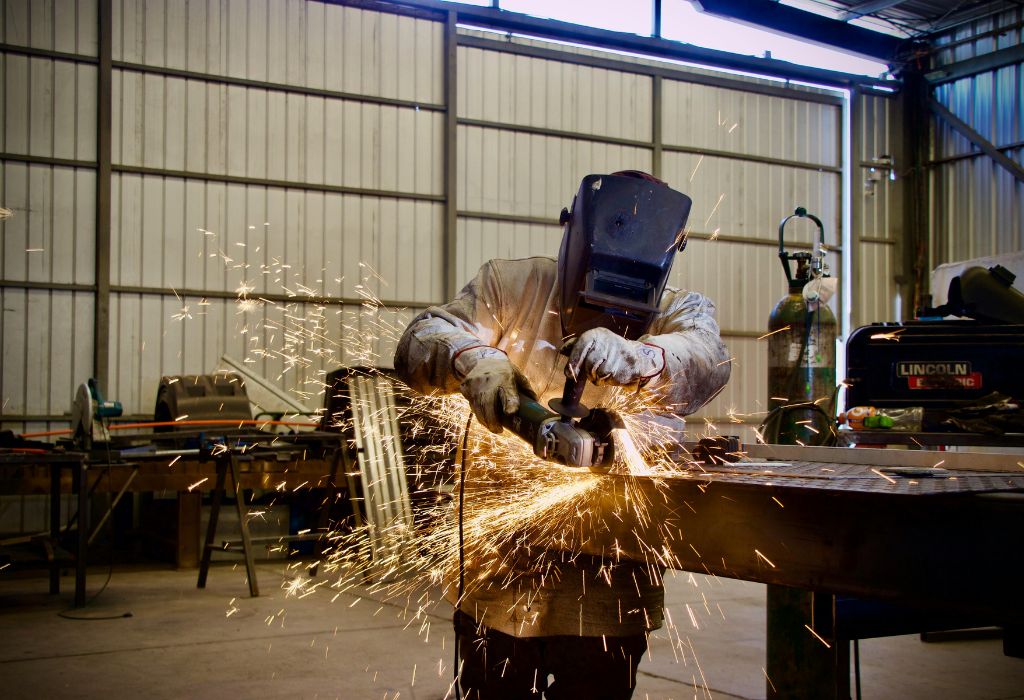Inside a massive industrial plant, welders bend over glowing seams as sparks illuminate the steel around them.
Among them, specialized welders handle the most demanding tasks, from precision TIG welding on stainless steel to joining high-pressure pipelines under strict codes.
The question for many aspiring tradespeople is clear: how to become a specialized welder in 2025?
The welding industry is evolving rapidly as technology, materials, and global infrastructure projects expand.
According to the U.S. Bureau of Labor Statistics, the welding field is projected to add over 42,000 job openings annually due to retirements and demand (BLS).
Yet not all welders earn the same—specialists often command higher pay and better opportunities because their skills are harder to replace.
Specialized welders work in industries where mistakes are costly. From sanitary stainless welds in food and pharmaceutical plants to exotic alloys in aerospace, the expertise required goes beyond general welding.
The ability to pass rigorous tests such as the 6G pipe welding certification or industry-specific codes often separates a standard welder from a sought-after expert.
Curiosity often surrounds the process of specialization: is it only about certifications, or does it require years of on-site practice?
In reality, becoming a specialized welder is a structured path that blends education, apprenticeship, advanced testing, and continuous upskilling.
Each step builds credibility and opens doors to industries where precision and safety are critical.
This guide explains exactly how to become a specialized welder in 2025.
It covers the essential skills, certifications, training routes, industries in demand, and the future trends shaping this profession.
By the end, readers will have a clear action plan to turn welding basics into a specialized, high-value career.
Quick Answer — Fastest Way to Become a Specialized Welder

The fastest way to become a specialized welder in 2025 is to build a foundation in core welding skills, then focus on a niche through targeted certifications and practice. Most start with a high school diploma or GED, enroll in a welding program or apprenticeship, and then progress into areas such as pipe welding, TIG stainless, or aerospace.
Specialization often requires passing advanced certification tests like the 6G pipe weld or industry-specific code qualifications. These prove proficiency in demanding positions and materials. Once certified, welders can move into higher-paying roles in refineries, shipyards, nuclear plants, or aerospace facilities.
The timeline varies, but many welders reach specialist-level pay within 1–3 years. Bootcamps and fast-track programs can shorten the journey, while apprenticeships provide paid training over longer periods.
Can you specialize without formal schooling?
Yes, apprenticeships and on-the-job training can lead to specialization, though structured programs accelerate the process.
Which certification matters most for specialists?
The 6G pipe welding certification is highly respected across industries.
How long does it take to specialize?
On average, 1–3 years depending on niche, training path, and test success.
Do unions or contractors offer better paths?
Both provide opportunities—unions offer structure and benefits, while contractors may offer faster entry.
Is 2025 a strong year to specialize?
Yes, demand remains high due to retiring workers and new industrial projects.
What “Specialized Welder” Means (And Why It Pays)
Definition & Scope
A specialized welder is a professional with expertise in a specific process, material, or industry. They often handle tasks where precision, safety, and compliance with codes are critical.
Common Specialties
Popular welding specializations include pipe/pressure welders, aerospace welders, sanitary stainless welders, underwater welders, and nuclear-certified welders. Each demands unique skills and certifications.
What is the difference between a general welder and a specialist?
Specialists work under strict codes and pass advanced tests, while general welders often handle broader tasks.
Do specialized welders earn more?
Yes, specialized skills are in higher demand, leading to premium wages.
Can a welder hold multiple specialties?
Yes, stacking specialties such as TIG stainless and pipe welding increases career flexibility.
Is specialization always necessary?
Not always, but it opens higher-paying roles and career mobility.
Which specialty has the most global demand?
Pipe and pressure welders are consistently in demand across industries.
Education Paths — School, Bootcamps, or Direct-to-Work
Trade School / Community College
Many welders start with 6–12 month trade programs or 2-year associate degrees. These courses provide structured training and access to industry-standard equipment.
Fast Bootcamps
Short bootcamps lasting 8–16 weeks focus on specific processes like TIG or MIG welding. These are ideal for those seeking rapid entry into specialty roles.
Direct Entry (Helper to Welder)
Some choose to enter as helpers or assistants, gaining on-the-job experience while taking night classes or employer-sponsored training.
Do you need a degree to become a specialized welder?
No, practical skill and certifications matter most.
Is bootcamp training enough?
Yes, if combined with certifications and hands-on practice.
How can helpers advance quickly?
By logging daily practice hours and preparing for certification tests.
Which classes are most valuable?
Blueprint reading, metallurgy, and advanced welding processes are critical.
Do schools guarantee jobs?
Not directly, but schools with strong employer partnerships often improve placement rates.
Certifications & Credentials That Open Doors
Certifications are essential for proving competency in specialized welding roles.
Code Tests
Common certifications include AWS D1.1 for structural welding, ASME Section IX for pressure piping, and API 1104 for pipelines.
Safety & Site Access
Cards like OSHA-30, Confined Space Entry, and TWIC are often required for specialized job sites.
Specialty Credentials
Advanced skills such as orbital TIG welding or aluminum spool gun proficiency enhance job opportunities.
Which certification should come first?
A 6G pipe certification is a strong foundation for most specializations.
Do certifications expire?
Yes, most require renewal or continuity logs.
What’s the difference between AWS and ASME?
AWS focuses on structural welding codes, while ASME governs pressure and piping.
Are safety cards optional?
No, many employers require them before granting site access.
Do certifications guarantee higher pay?
They don’t guarantee it, but they strongly increase earning potential.
Choosing Your Niche — Finding the Right Specialization

Match Interests and Market
Specialization should balance personal interest, local demand, and job mobility.
Difficulty & Learning Curve
Some niches like TIG stainless or underwater welding require higher precision and longer practice hours.
Lifestyle & Earnings
Pipeline work often involves long travel, while sanitary welding offers cleaner environments.
Which specialty is easiest to enter?
Sanitary stainless welding often requires shorter training programs.
Which specialty pays the most?
Pipeline welders and underwater welders often earn premium wages.
Which is best for steady work?
Maintenance and repair in utilities and refineries offer consistent demand.
Do all niches require relocation?
Not all—food and pharmaceutical industries often hire locally.
Which niche is future-proof?
Aerospace and nuclear welding are growing due to new technology demands.
Skills Roadmap — From Core to Specialized
Foundation Skills
Start with basic welding positions and advance toward pipe and pressure welds.
Specialty Skills
Learn purge control for stainless, aluminum welding for aerospace, or metallurgy for exotic alloys.
Inspection Mindset
Specialized welders must read Welding Procedure Specifications (WPS) and understand inspection methods.
How many hours to master 6G welding?
Hundreds of hours of practice are often needed.
Is TIG welding essential?
Yes, for most high-spec industries.
What’s the hardest test?
Many consider the 6G pipe test one of the toughest.
Does purge quality affect results?
Yes, poor purge control often leads to weld failure.
Should welders log practice hours?
Yes, tracking helps measure progress and readiness for certification.
Apprenticeships, Unions & Contractor Routes
Union Programs
Unions like UA or Ironworkers offer structured apprenticeships with benefits.
Non-Union Contractors
Provide faster entry but may lack structured benefits.
Finding Openings
Use apprenticeship.gov, contractor websites, or union halls to apply.
Are apprenticeships paid?
Yes, apprentices earn while learning.
Can apprentices switch unions later?
Yes, depending on local rules.
Do contractors require re-testing?
Yes, most require site-specific weld tests.
Are union benefits better?
Yes, unions typically offer healthcare and pensions.
Is travel mandatory?
Often yes, but local options exist in some industries.
Tools, PPE, and Specialty Gear
Personal Protection
Auto-darkening helmets, flame-resistant clothing, and respirators are essential.
Specialized Tools
Stainless welders use purge kits, while aerospace welders need precision TIG machines.
Measuring Tools
Weld gauges, thermometers, and gas flow meters are common.
Which tools are day-one essentials?
Helmet, gloves, grinders, and gauges.
Do employers provide tools?
Basic shop tools, yes, but personal gear is your responsibility.
What’s the cost of a starter kit?
Between $500–$1500 depending on quality.
Do brands matter?
Yes, for reliability and safety.
Is orbital TIG welding mandatory?
No, but knowledge helps in pharmaceutical and aerospace industries.
Job Market Outlook for Specialized Welders
Industries Hiring in 2025
Energy, aerospace, shipbuilding, food, and nuclear industries all need specialists.
Career Growth
Experienced welders can advance into supervisory roles or inspection jobs.
Global Opportunities
Specialized welders often find overseas contract work.
Which industries are most stable?
Food, pharmaceutical, and utilities offer long-term employment.
Which industries pay the most?
Pipeline, shipyard, and offshore welding often pay premiums.
Can specialized welders work abroad?
Yes, international demand is strong.
What’s the average pay?
Specialized welders earn 20–40% more than general welders.
Is certification valid worldwide?
Not always—some countries require retesting.
Safety, Codes, and Work Culture
Specialized welders must follow strict safety standards and code procedures. Mistakes can lead to rework or safety incidents.
Is OSHA training required?
Yes, OSHA-10 is often mandatory.
Do shortcuts ever pass inspection?
Rarely—code inspectors look for full compliance.
What leads to rework?
Improper fit-up or ignoring the WPS.
Are soft skills important?
Yes, employers value punctuality and teamwork.
What’s the most common safety citation?
Improper PPE use or poor housekeeping.
Timeline, Costs, and ROI

Sample Timelines
6–12 months in training plus 1–2 years for specialization.
Training Costs
Programs range from $5,000 to $15,000 including tools.
Return on Investment
Specialists quickly recover training costs with higher wages.
How much does training cost?
Typically between $5,000 and $15,000.
Who pays for certifications?
Many employers reimburse certification costs.
When do pay increases start?
After passing code tests.
Is overtime common?
Yes, especially on shutdowns and field projects.
Is relocation worth it?
Often, as higher pay and per diem offset moving costs.
Future Trends in Welding Specializations
Technology in 2025
Digital WPS records, robotic welding, and automation are expanding.
Materials of the Future
Titanium, Inconel, and composite materials are increasingly used.
Future-Proof Skills
Orbital TIG welding, advanced NDT, and digital traceability are rising trends.
Will robots replace specialized welders?
No, they will assist but not replace human expertise.
Which skills are most future-proof?
TIG stainless and high-alloy welding remain essential.
Is digital certification valuable?
Yes, it helps meet modern compliance standards.
Will demand continue?
Yes, global infrastructure projects sustain welding demand.
Should welders keep learning?
Absolutely, continuous learning ensures job security.
Conclusion — Your Action Plan
Becoming a specialized welder requires education, practice, certification, and adaptability. In 2025, demand for these experts continues to rise across industries worldwide.
Start with core welding skills, choose a specialization, earn the right certifications, and build a portfolio that demonstrates precision and consistency. Pairing technical ability with safety and reliability creates a long-term career path with excellent earning potential.
What’s the first step today?
Choose a specialization and commit to training.
How do you stay employable?
Keep skills current, maintain safety standards, and stay flexible.
Is specialization worth it?
Yes, it unlocks higher pay, mobility, and long-term security.
Which two specialties pair best?
Pipe welding and TIG stainless complement each other.
Final takeaway?
Specialization is the key to standing out in welding and building a successful, future-proof career.

I’m Darrell Julian, the founder, lead writer, and hands-on welding enthusiast behind ArcWeldingPro.com. With more than 15 years of real-world welding experience, I created this platform to share what I’ve learned in the field, in the shop, and in the heat of the arc.


